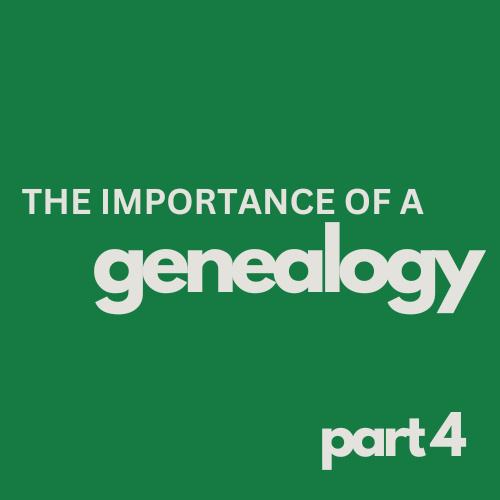Do you know any name-droppers? You know what I mean! The people that find joy in casually mentioning things like… “oh, yeah, I was just grabbing lunch with the mayor, and…”
The mayor? THE MAYOR?
Don’t get mad at me for what I am about to say… but there’s a lot of this in the church. Name-dropping pastors, worship leaders, teachers, blah, blah, blaaaaaaah.
Okay, sorry, I will stop.
At the end of the day, name-dropping can get pretty annoying. BUT! Name-dropping in the Bible is a totally different story. Name drops are always intentional in scripture…
…especially in geneologies.
What’s in a Name?
In biblical genealogies, every name matters. Even those names that are super weird, you can’t pronounce, and the ones you just tend to skip over when you’re reading through a “Bible in a Year” plan. Gosh, why am I so spicy today?!
These names aren’t just filler. They operate more like fingerprints. The names in a genealogy aren’t just there for family history. They help us develop a sound theology that aligns with the author’s intended purpose.
Thus, names are used to teach, preach, and remind us of… well… something. Always something!
So, for fun, let’s zoom in on just one name. This is a good example of a name that barely gets noticed, but helps us see the beauty of the metanarrative of scripture.
Zerubbabel
Yep. You read that right. Read that right, because I know good and well you didn’t try to say it out loud!
[[ For what it’s worth, Zerubbabel is pronounced “zuh-RUB-uh-buhl.” You’re welcome! ]]
This name appears in the genealogies provided by both Matthew and Luke. This is how they read…
Matthew 1:12 (ESV)
“And after the deportation to Babylon: Jechoniah was the father of Shealtiel, and Shealtiel the father of Zerubbabel…”
Luke 3:27 (ESV):
“...the son of Joanan, the son of Rhesa, the son of Zerubbabel, the son of Shealtiel…”
Same guy. Two lines. One story.
Zerubbabel shows up in the post-exilic period. Long story short, he is the governor of Judah after the Babylonian exile and has been tasked with rebuilding the temple. In a way, he’s the bridge between Israel’s past and future.
He steps into the rubble and starts restoration. Sound familiar?
A Shadow of the Savior
Zerubbabel was a descendant of David, which meant he was of royal descent. Unfortunately for him, at the time, Judah was under foreign control.
So he wasn’t a king, he was a governor. A placeholder, so to speak.
Yet, the prophets didn’t forget him. Haggai 2:23 (ESV) records God’s word to Zerubbabel as the prophet writes, “...I will take you, O Zerubbabel my servant, the son of Shealtiel... and make you like a signet ring, for I have chosen you…”
A signet ring represented authority, identity, and belonging. Thus, God was ensuring that he was a part of the plan. Even though he wasn’t on the throne, the Temple was under construction and unfinished.
In this way, Zerubbabel becomes a symbol, a whisper of what’s to come. He is a leader who rebuilds. He is a chosen servant. He is a descendant of David.
…but not the final fulfillment. That comes later! (You starting to see it?)
From Ruins to Redemption
Zerubbabel helps us see the movement from exile to return, destruction to hope, and silence to promise. That’s why his name matters in the genealogy. It reminds us that the line of Jesus didn’t skip the pain… it went straight through it!
Right through Babylon, rubble, and years of waiting.
The family line of Jesus is full of broken things being restored. This helps us realize, through a simple genealogy, that your own brokenness isn’t disqualifying. It might just be the space where redemption shines brightest.
What Does This Teach Us?
It teaches us that every season matters. That God works through kings and governors. Through exile and return. Through people with weird names and painful stories.
It teaches us that Jesus didn’t come from a perfect line. He came from a redemptive one. It teaches us that no matter where you come from… You can be a part of the story!
[[ For what it’s worth, genealogies don’t just tell you who someone is. They tell you what God is up to. ]]
One Last Drop
Zerubbabel isn’t the only surprise in the list. You’ve got Rahab, a Canaanite. You’ve got Ruth, a Moabite. You’ve got Bathsheba, who isn’t even named—just called “the wife of Uriah.” You’ve got exile, scandal, suffering, and faith.
All of whom an entire book could be written about.
Yet still, God weaves it all together.
Jesus’ genealogy isn’t cleaned up. It’s just redeemed. That’s the whole point!
Hopefully, That Made Sense
We’ve come to the end of the line (see what I did there?).
These genealogies are more than historical documents. They’re theological declarations that God keeps promises. He redeems what’s broken and includes the unexpected.
They show Jesus came through the mess to heal the mess. Even the name-dropping matters because in every name, there’s a note of grace.
Until next time,
Petey




Powerful and a necessary word! Thank you
Thank you!!! Now I understand Biblical name dropping!! aka purpose and reasoning!!